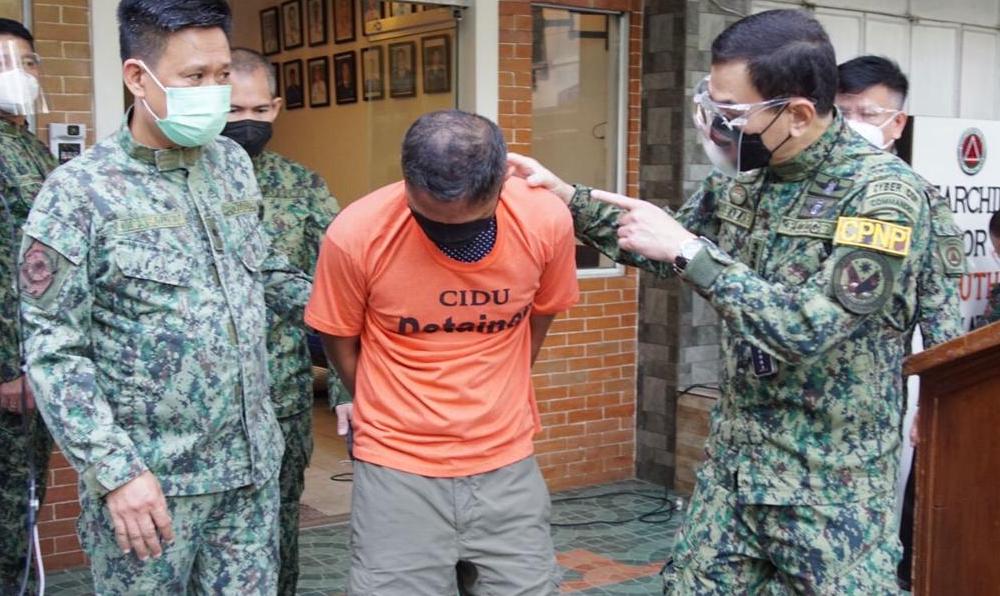Yesterday, May 31, another brazen police officer killed a civilian. This morning, June 1, Police Master Sergeant Hensie Zinampan was arrested in Quezon City over a murder case filed after he shot dead 52-year-old Lilybeth Valdez.
According to an earlier police report, Valdez was buying cigarettes at a store in Barangay Greater Fairview at about 9:30 p.m. when Zinampan approached and confronted her. In the middle of their heated argument, Zinampan drew his firearm and shot Valdez at the back of her head. Zinampan initially denied the charges.
The Philippine National Police (PNP) noted in a statement, however, that a circulating video of the exchange provided evidence that the police officer was already holding his gun before he approached Valdez and that he grabbed her before shooting at close range.
In the chilling clip showing an allegedly drunk Zinampan, he showed no signs of hesitation or remorse. Based on the ongoing investigation, PNP stated that Zinampan got into a scuffle with Valdez’s son on May 1 and that the officer had threatened the Valdez family after the initial incident.
ELEAZAR VOWS TO DISMISS COP IN COLD-BLOODED MURDER OF A WOMAN IN QC, ASSURES FAMILY OF JUSTICE
General Guillermo…
Posted by Philippine National Police on Monday, May 31, 2021
After Zinampan’s arrest, PNP chief General Guillermo Eleazar vowed to “personally monitor the legal offensive against a police sergeant behind the cold-blooded killing of a woman in Quezon City,” according to a PNP statement. He added that he has instructed Quezon City Police District director Police Brigadier Gen. Antonio Yarra and Internal Affairs Service Inspector General Alfegar Triambulo to expedite the investigation. Apart from the murder case, an administrative case will also be filed against Zinampan. It seems the viral evidence has fast-tracked the PNP’s response to the case and talks of Zinampan’s impending dismissal from the force.
“Patuloy ang internal cleansing natin sa mga nakalipas na taon but on my part, we want it to be long-term kaya umpisa pa lang, pigilan na natin na makapasok sa PNP ang mga ganitong klaseng pulis dahil hindi lang nila sinisira ang aming organisasyon kundi nagiging perwisyo din sa taumbayan na dapat naming pinaglilingkuran at binibigyan ng seguridad,” said Eleazar.
However, we cannot dismiss numerous incidents of police brutality (such as Police Senior Master Sgt. Jonel Nuezca’s double-murder case) which were deemed “isolated cases”—a claim that has been refuted by the Commission on Human Rights (CHR). Is condemning violent acts caught on camera enough to combat a culture of violence?
When Eleazar talked about police reform, he mentioned enacting a stricter recruitment process as well as removing corruption and the padrino system within the police force. However, a number of activists and academics argue that policing is “inherently violent” since police officers rely on the use of force to enforce laws.
“The conversation about training misses the larger culture of policing that sees lethal force as the ultimate tool to suppress crime,” said Khalil Gibran Muhammad, professor of history, race and public policy at the Harvard Kennedy School. “As long as we keep talking about individual police officers, we’ll keep making for a broken and sick society. Clearly, policing has reached the level of a public health crisis. It’s not just in the shooting of unarmed people. It’s also in the everyday assaults, brutalities and indignities that people face.”
View this post on Instagram
There are numerous well-documented accounts of officers using excessive force when demanding submission from civilians here and abroad. Perhaps even more troubling is how often state leaders like President Rodrigo Duterte applaud and encourage this violence. In the past, Pres. Duterte has offered bounties to members of Indigenous communities to kill rebels like paramilitaries would. Another example? PNP has previously denied that it set a quota of anti-drug arrests but admitted that its regional directors were pressured to do “30 to 40” anti-drug operations per month. So, is change possible?
Many argue that police abolition is the key to ending impunity and developing a humane justice system. But for those who are not ready for that conversation, defunding the police is a good alternative. Provide the force with less weapons and allocate more funds to community rehabilitation programs instead.
In 2020, the national budget for the Department of National Defense (DND) was P192.1 billion while the Philippine National Police (PNP) received P187.3 billion. In contrast, CHR’s 2020 budget was P8.19 million while the Department of Health’s budget was P176 billion. That’s a pretty large difference considering how unnecessary armed response was compared to the demand for medical services in the pandemic—not to mention how DND and PNP have yet to regain public trust.
Photo courtesy of the Philippine National Police
Follow Preen on Facebook, Instagram, Twitter, YouTube and Viber
Related Stories:
What if there were no cops? On a world without police and military forces
Grieving moms shouldn’t be treated this way, Manila police
Police arrested 7 protestors, not terrorists, in UP Cebu
Must-reads on police brutality for citizens of a country afraid of its people


